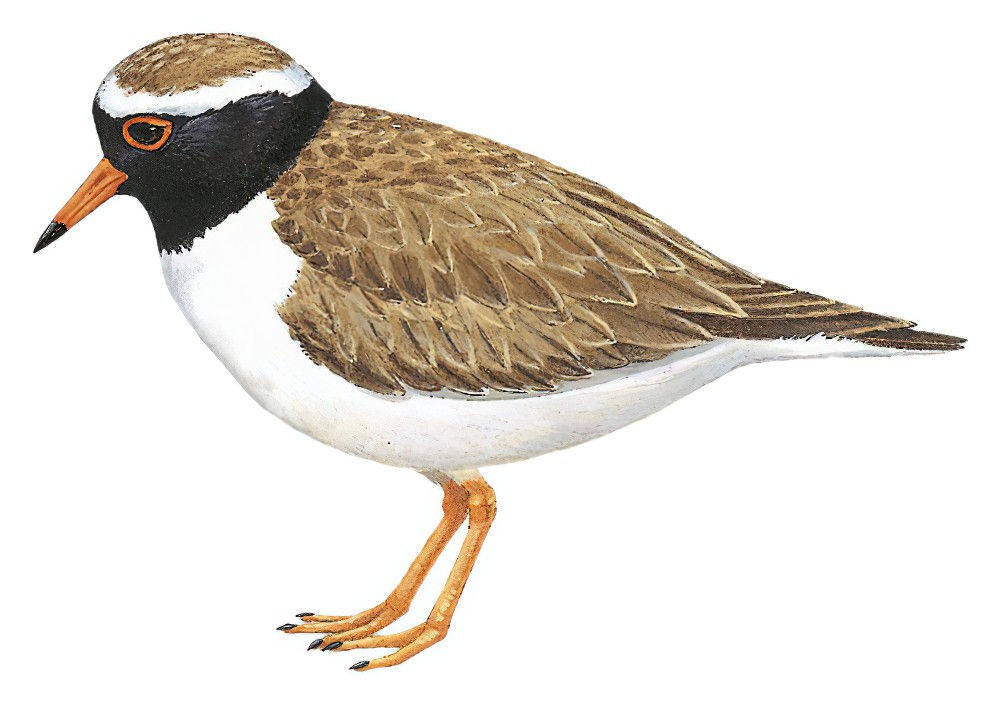Shore Plover / Thinornis novaeseelandiae

Shore Plover
SCI Name:
Protonym: Charadrius novae-Seelandiae Syst.Nat. 1 pt2 p.684
Taxonomy: Charadriiformes / Charadriidae / Thinornis
Taxonomy Code: shoplo1
Type Locality: New Zealand = Queen Charlotte Sound, South Island, ex Latham, Gen. Syn., 3, pt. 1, p. 206, no. 10, pi. 83.
Author: Gmelin, JF
Publish Year: 1789
IUCN Status: Endangered
DEFINITIONS
THINORNIS
(Charadriidae; Ϯ Shore Plover T. novaeseelandiae) Gr. θις this, θινος thinos beach; ορνις ornis, ορνιθος ornithos bird; "THINORNIS. Bill long, slender, scarcely swollen at the apex, which is acute; the nostrils lateral, basal, placed in a nasal groove that extends for two-thirds of the bill. Wings long, pointed, and with the first and second quill nearly equal and longest. Tail long and rounded. Tarsi as long as, or shorter than, the middle toe, and strong. Toes long, strong, united at the base and margined on the sides, the hind toe wanting. These birds differ from Hiaticula, in the length and slenderness of their bills, and in the strength and shortness of their tarsi, and also in the strength of their toes. THINORNIS ROSSII. ... A single specimenof this bird was brought by the Expedition from Auckland Island. THINORNIS NOVÆ SEELANDIÆ. ... "Habitat ad ostia rivulorum et littora maris glareosa in insula australi Novæ Zeelandiæ in Portu Obscuro." Forst." According to Forster's drawing it is called by the natives Doodooroo attoo, and was found at Queen Charlotte's Bay. Mr. Percy Earl found a pair of this, what he terms very rare, species, on the coast between Tairi and Otago, South Island. It was called by the natives Kukuruatu. (G. Gray 1845); "Thinornis G. R. Gray, Voy. 'Erebus' and 'Terror,' Bds., 1845, p. 11. Type, by monotypy, Thinornis rossii G. R. Gray = Charadrius novae-seelandiae Gmelin." (Peters 1934, II, 257).
novaeseelandiae
L. novus new; Mod. L. Zeelandia or Seelandia Zeeland, Netherlands; i.e. New Zealand (also New Zeeland and New Zeland, which received its name from the explorer Abel Tasman who explored the west coast in 1642, naming it Nova Zeelanda after his Dutch home).
● ex “New-Zealand Lark” of Latham 1783 (Anthus).
● ex “New-Zealand Duck” of Latham 1785 (Aythya).
● Erroneous TL New Zealand (= Tahiti); ex “Red-rumped Parrot” of Latham 1781 (syn. Cyanoramphus zealandicus).
● ex “New-Zealand Falcon” of Latham 1781 (Falco).
● ex “New-Zealand Titmouse” of Latham 1783 (Finschia).
● ex “New Zealand Pigeon” of Latham 1783 (Hemiphaga).
● ex “New-Zeeland Owl” of Latham 1781 (Ninox).
● ex “New Zealand Creeper” of Brown 1776, and “Poë Bee-eater” of Latham 1782 (Prosthemadera).
UPPERCASE: current genus
Uppercase first letter: generic synonym
● and ● See: generic homonyms
lowercase: species and subspecies
●: early names, variants, mispellings
‡: extinct
†: type species
Gr.: ancient Greek
L.: Latin
<: derived from
syn: synonym of
/: separates historical and modern geographic names
ex: based on
TL: type locality
OD: original diagnosis (genus) or original description (species)












